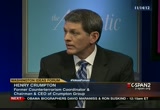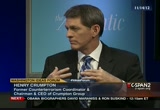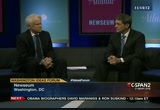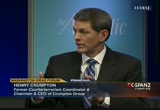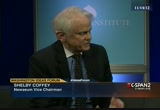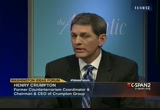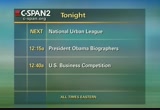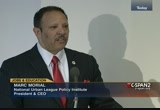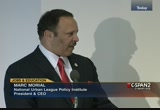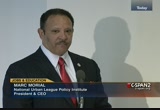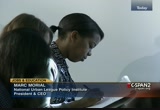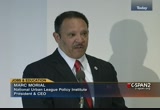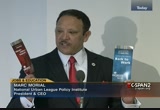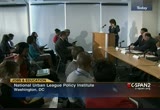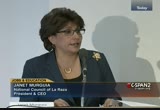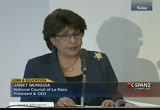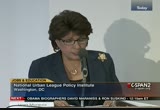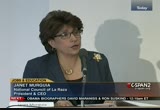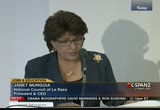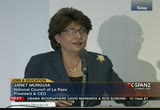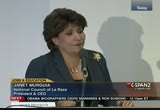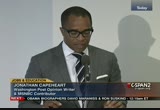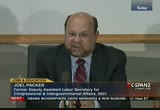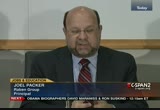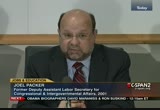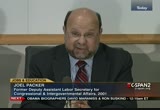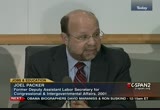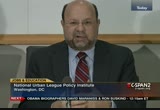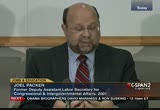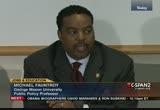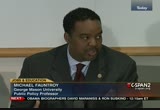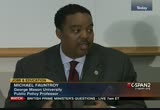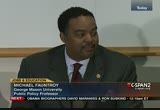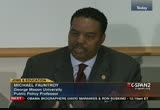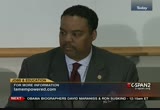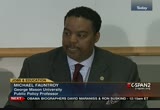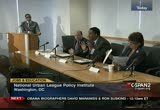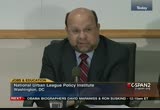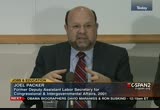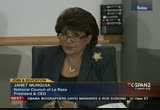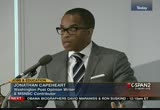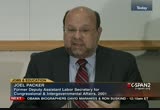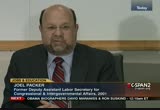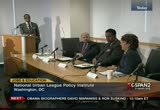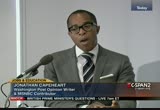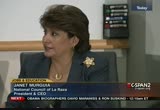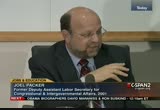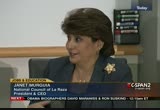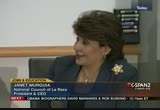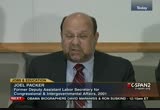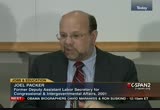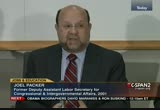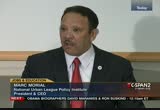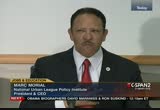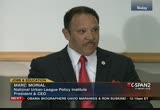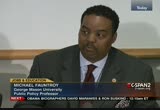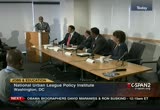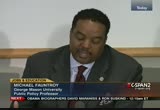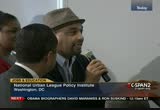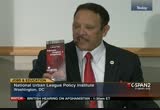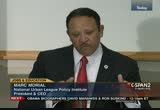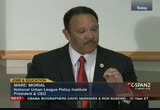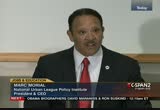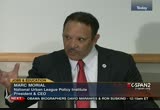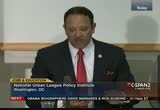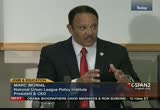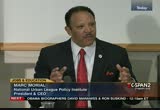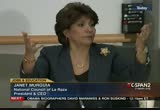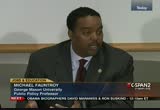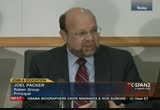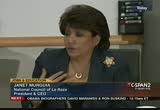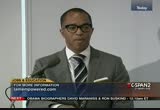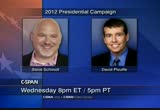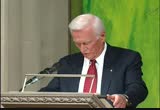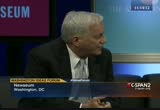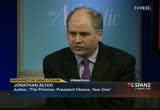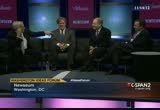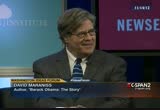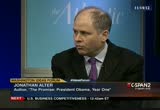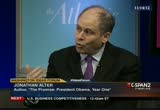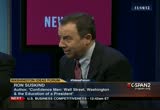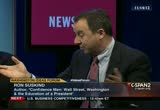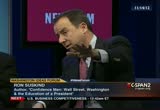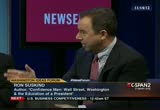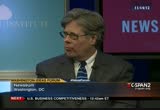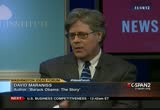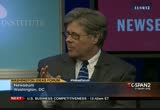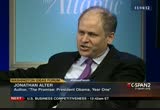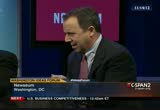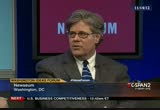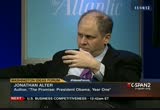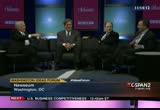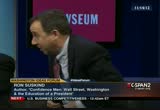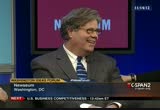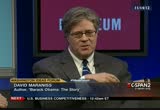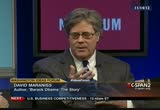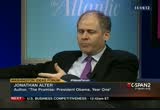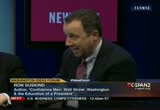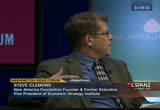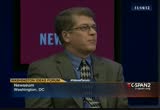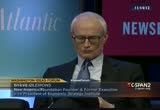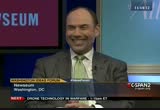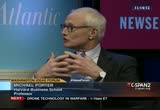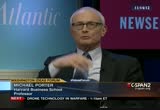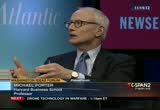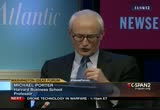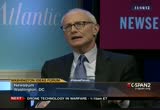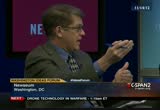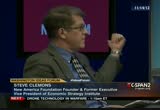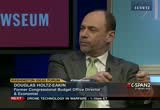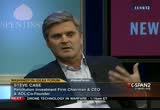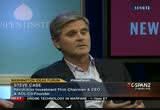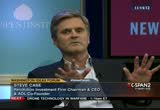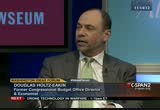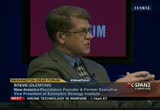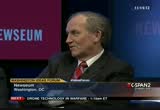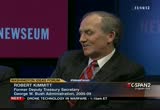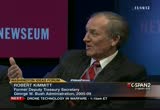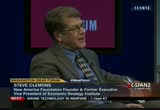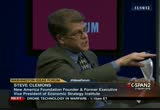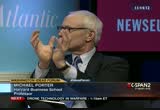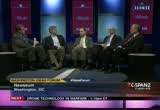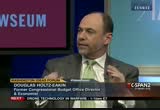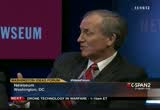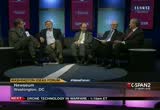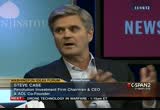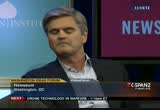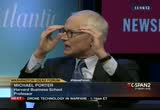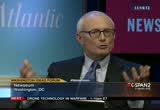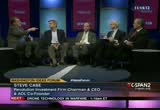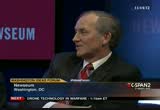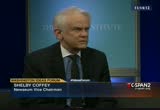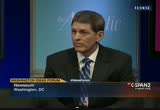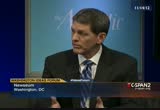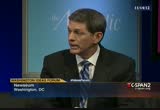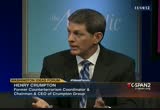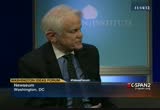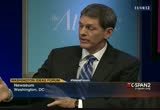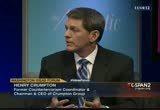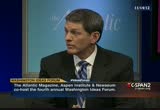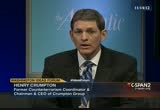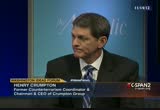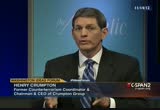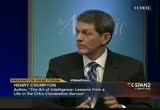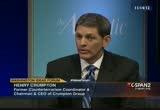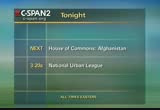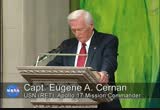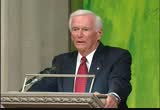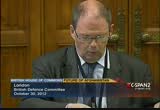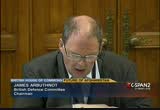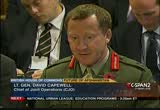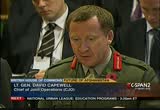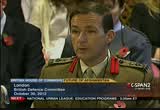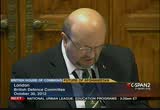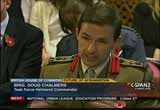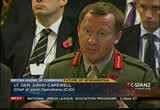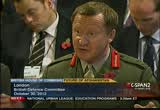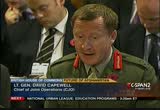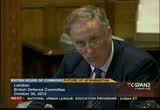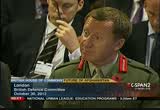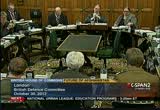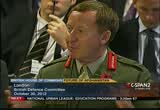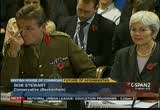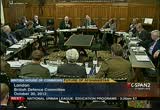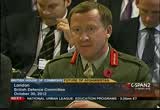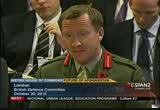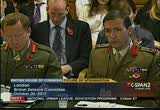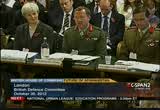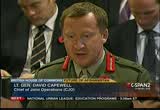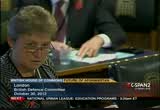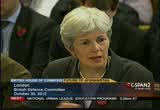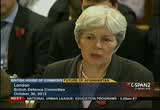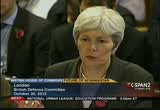tv Capital News Today CSPAN November 20, 2012 11:00pm-2:00am EST
11:00 pm
a third of americans are obese. you can sum that i have to make you strong nation if we are broke and ignorant and fat? [laughter] and so i would start with that. in terms of overseas, i believe the changing nature of warfare, the changing nature of risk even we have called up to that reality. you got this growing asymmetry of power and not just al qaeda, hezbollah was the cyberspace, but it can be very positive, too. the next is bill gates a nonstate, look what he's done and how he's contributed. zucker berquist is to develop a society of a billion people network. there's been a positive examples if you look at the asymmetry of power. i won't nonstate at yours and
11:01 pm
increasingly this complex, global, integrated that oldfield or marketplace. such is the nature of war and risk we have to understand better. secondly, cyberspace. my good friend, general mike hayden has talked about the coming pearl harbor in cyberspace and i agree with him. it's going to happen and we are willfully bug prepared. the third area i was stressed is the growing demographic shift worldwide. for the first time as of last year more people live in cities and that trend is accelerating. if you like in societies like africa, what does that mean in terms of demographics or resources? these changes will accelerate and we need to be better prepared for the across-the-board. those are three large general chunks we should focus on. >> was focused a little tighter for a minute. you have been quoted as saying
11:02 pm
that there are very likely as many or more spies working against u.s. interests inside the u.s. during the cold war, which was a head snapping quote when i read it. who are these people and what are they after? >> i don't know that. i've been on the government for six years, but if you look at the value of intelligence, importance of intelligence in the expenditures of resources by china, by russia, but others and look for them is one of the biggest is. well it's the u.s. not only national security secrets, the commercial seats as be of much of can be gleaned or stolen from cyberspace. it is a dire threat in part because we shifted so much attention, so much resource and
11:03 pm
the counterterrorism arena we've forgotten the necessity of old-fashioned counterintelligence and that's an important element of this. >> often i've heard some people involved in counterintelligence tends to be seen as the redheaded stepchild of the intelligence world. why is that when we need it and what is the cure for a? effect in part because it's something we don't want to think about. to think that our agencies and businesses have been penetrated by a foreign power, criminal organization and would rather think about how do we achieve that goal? a foreign-policy goal or profit objectives. but it's more fun. that is more positive and we are very positive nation. we can also be more disciplined about how we think of protecting our intellectual property and most of all our people. >> one of the things that also
11:04 pm
comes up in the hyper connected world that we are red with digital things is how does this spy that we think of safe from the 39 step, hitchcock thriller has to go through customs with their pictures are taken. can they cannot be operation in abu dhabi several years ago when the hamas leader was killed and the perpetrators were seen. how do you go off the grid now as a spy? how can you go through? just asking for little trade plan. is that so wrong? [laughter] >> again, i would underscore the discipline. trade craft is mostly about discipline and paying attention to detail or whether it's a disguise with those cover story.
11:05 pm
increasingly your partners. we tend to think of the spy as this unilateral hero and there is still some of that and there always will be. but the growing interdependence of an attack about a race, it is increasingly building alliances and partnerships, trusts and partnerships for you can work with other services and other entities around the world. that is overall a good thing. >> when you are called by director john mclaughlin a genuine american hero, he is not a who is given likely to that kind of thing. so we thank you for joining us as an american hero. [applause]
11:06 pm
>> now, the national urban league hosts a discussion on education and jobs. the penal code which includes the head of the urban league mark morel talks about the spending priorities as lawmakers face potential budget cuts. this is just over an hour. >> let me contextualize urban ideas forum. not recently, you heard it from
11:07 pm
that former candidate for high office talk about urban as being the reason that one ticket was not successful on november the sixth. in using a term, he may have been to characterize urban as meaning from them urbanist not. urban is not a synonym for black or african american. urban is not a synonym for hispanic latino or asian. urban is not a synonym for
11:08 pm
communities of color. what urban represents is the coming together, the mixture, the melting, the synthesis of all the communities of america. look at america's urban communities today. in america's urban communities, every group resides. every economic class resides. every strand of political philosophy resides. great academic institutions make up the fabric of urban america. great media organizations, libraries, cultural institutions make it the fabric of urban
11:09 pm
america. urban represents the best of america and represents the 21st century america is really all about, which is each and every one of us together, deplorably spooned them. so i encourage people b&b around terminology that we understand what it means. and so the. , while it is a discussion about challenges, problems and solutions that urban communities face, it is a discussion about challenges, opportunities, solutions for the nation at large. i submit to you in 21st century america, the suburbs are now part of urban america.
11:10 pm
witness the suburbs of this capital city, whether it's northern virginia or maryland and you find the very same tapestry of america that i describe. so the national urban league and our policy institute in organizing this urban ideas forum begins what i hope and confident will be a series of forums like this where we can have a candidate, open a deal oriented exchange about some of the solutions that the nation needs today and some of the ata is that we will walk over to both the white house, the agencies in capitol hill and encourage because they are not
11:11 pm
only best for urban america, they are best for all of america. and that is the spirit with which we began this conversation today. final points. i emphasize with colleagues and friends all the time that the national urban league is not a tank tank, but we know how to sing. we are not a talk tank, but we know how to talk. we already do take. our intent is discussion, a just and not leadership that lead to action and action that leads to result in results that the changes in the lives of old. and so today, there is an abundance of information that's going to be shared. i do want to highlight these two documents in the folders.
11:12 pm
one is our education, a plan. the other is our jobs plan, which have been assembled by a team of expert staff and others and affiliate leaders over the last two years, which frame up some of our thinking. so again, i want to take them back for coming. we appreciate everyone. it's a great great discussion today and have a great weekend and happy thanksgiving suv today. it's now my pleasure to introduce a good friend of the national urban league and one of the nation's most important voices in the 21st century on a wide range of issues. she leads the nation's largest is a mix of deceit are. ladies and gentlemen, jannette murguia. [applause] >> good morning, everyone in
11:13 pm
thank you so much for the opportunity to be here today. i want to especially of course thank my good friend and colleague, marc morial. he and i started about the same. maybe he was on a year or two before i did and our respective organizations and i'm so proud and appreciative of the partnership that we have established in the understanding he and i share and this commitment to come together across communities of color and to tackle those issues and challenges that we face together. mark is a true champion for economic justice, social justice, fairness and equality and it's been a great mentor to me. it's no surprise at the center of an ideas forum, here is marc morial leading the way and the urban league leading the way. it's at the point of right to be here. the national urban league has worked together on a host of
11:14 pm
issues from addressing the foreclosure crisis that has decimated both our communities to expanding green jobs and other 21st century job opportunities to making sure all her kids and families have access to the latest technology and brought and peered our partnership is a model for how communities can work together on the issues of greatest importance to them. and i think all of you for that. certainly there is no more urgent issue for communities and job creation. the tenets of african-americans are experiencing unemployment rates are much greater than the national average and i believe this has to be a primary focus for president obama and the congress in his icann chairman for the new congress. why? because that is what our communities, which turned out in record numbers voted for and we made the difference in this election despite the fact that
11:15 pm
some states and a lot of people tried everything in the book to keep us from voting. so we do have some work ahead of us and i want to highlight a few things we can do. first of the debate over the fiscal class i'm a to ensure working families or protect it, which means that eviscerated the programs that help support working families including workforce investment and important training programs. we need to stress that this is not just an issue for our communities, before the country country. since african-americans, asian americans and latinos make up one third of the u.s. workforce today, a figure which will skyrocket in years to come. second, investing in the future of children. african-american and latino kids are the workforce of the future to the investments we make now will pay out dividends when i really need to in the decades to come as the baby boomers start to retire.
11:16 pm
they key is better education and especially important issues giving the communities of color represent nearly half of today's students in k-12. we need to increase funding for education, especially preschool education, the single most effective way to ensure a child's academic success in school. third, we need to support the local organizations that are on the ground serving these communities and making the most difference in our communities. organizations such as local urban lakes and community-based organizations in the hispanic community. the bang for the back week after investing in in these groups enormous because they know how to do it in innovative and entrepreneurial fashion and they have business models that have allowed them to succeed. finally, there is a need or a deal of talk since the election whether there is no new light on the immigration issue.
11:17 pm
i believe there is and and we're working hard to capitalize on the momentum, election provides on this issue. we haven't heard about how enacting comprehensive immigration reform can help on the jobs and economy issue. simply put, immigration reform would create a fair, humane and effective system that levels the playing field for all workers. right now our immigration system doesn't work for anyone but unscrupulous employers. we need to take the power out of the hands of those who are exploiting our current immigration situation and put it back in the hands of workers and fair and honest employers. if all workers have a legal status, employers can't skirt labor laws said they have to pay fair wages and abide the rules. immigration reform is the right thing to do as well as the economically smart thing to do. children should not have to live
11:18 pm
in fear of their parents deportation every day of their lives and some of the hardest working and most honorable people in our society should not have to be subject to exploitation and harassment. finally, i would just like to say that i'm truly appreciative of the support we have received from the urban league and other african-american leaders on this issue. i know that there've been tensions in the past, but i believe like the reverend dr. martin luther king jr. that when we have this tensions we have to embrace them so we can get past them. this is our time to come together, break issues down. let's get a solution on this issue because i know when we come together we can figure this out. i had the privilege of march and most recently this year in the annual march from selma mike on my end for us to montgomery and alabama it was an incredible feeling. there i was with congressman
11:19 pm
john lewis, someone who obviously have the historic role from original march and so many others. it was at the kennedy. who is reverend al sharpton and there were hispanic leaders there including myself. the patient pacific american leaders and everyone came together. but we came over that bridge, i got a glimpse into what that might have been like in the past and i also go got a glimpse of what the future looks like. and it was powerful to me to know that we can come this far after her in so many challenges. the fact we were there together fighting against voter suppression was an anti-immigrant and anti-hispanic was that we came together as a coalition. he gives me great confidence to think that we can tackle many important issues we face today.
11:20 pm
you have a commitment from the national council to work with you while you to help review solution so we can keep the country stronger. thank you very much. [applause] >> and so at this time we are going to jab into the panel discussion and it's my pleasure to introduce seamus phan capehart. >> good morning, everyone. thank you all for coming. i am not used to doing the good morning and then waiting for the response back. so my apologies. thank you, jamal for the introduction. again, i'm jonathan capehart, opinion brighter at the
11:21 pm
washington post an msnbc contributor. they've set the stage for why we are here this morning, so i'm not going to keep talking. i'm just going to get started. you have heard from marc morial. next is joel packer, noted authority in federal education policy. to his left is dr. michael fauntroy at george mason university where he teaches urban policy comes civil rights policy and american government and we have just heard from janet murguia from national council of the bras. with that, mr. packer, to make is yours. >> first, thank you for the introduction and mark and chanel for others for having me on the piano with my colleagues here. so a couple of good things about the raising group in case you
11:22 pm
don't know. the briefing groups and government affairs, public affairs firm with 42 folks on our staff. overall majority of clients or progressive nonprofit organizations. firms really committed to advancing the ideals and missions of the whole broad range of the progressive community. personally i do education policy. as far as what the raising group i work for the national education association for 27 to doing policy for 35 years now. i wanted to talk first about some of the challenges we're facing because we face a lot of challenges. since her in washington all talk mostly about challenges we face, congress and the whole set of issues. so we'll start first with fun name. one of the clients they represent at raising group is the committee for education funding, which is a coalition of 100 national organizations which the name focuses on increasing federal investment in education.
11:23 pm
we are facing massive challenges there. since the recession started there's been a decline of 250,000 school district jobs. there's fewer teachers come if your counselors, fewer bus drivers and other staff that means larger classes from an error in the curriculum old programs come at things that. 35 states this year are spending less money on a per pupil basis after adjusting for inflation and they spent four years ago because it's been very sick if you can't state budget cuts to the state budget downturns. while state budgets start to recover, many school districts are very heavily dependent on property taxes and property values are far from the cupboard where they were and often assessments like behind what's going on with property values so we can expect continued decline some local school funding. at the federal level in the last
11:24 pm
couple years we've had a billion and a half dollars and cut to education programs. at the higher levels from the federal government has been restrictions on eligibility for the pell grant program. there's been restrictions on the student run program. so over the last couple years college students have contributed about four and a half billion dollars out of their pockets to his deficit reduction. so we've had thoughts of things squeezing us at different levels. we are now facing biggest threat through sequestered. janet mentioned the fiscal cliff in one part of the fiscal cliff is these across-the-board spending cuts to take effect january 2nd. it's going to be an 8.2% across-the-board cut in education, job training and health, housing, fbi, air traffic controllers from the food safety, entire range of domestic programs. for education if you count headstart, which is at the
11:25 pm
department of health and human services a $4.8 billion cut would be the largest education cuts ever in the history of the country. that would just move us -- essentially move us backwards on whether the goal is closing achievement gaps come increasing high school graduation rates, increasing college access and college completion. our biggest challenge in the short-term this lame-duck lame-duck session this to work together with groups like the urban league and national council to come up with a balanced approach to deficit reduction. as genocide, as people who can pay more to do so without balancing the budget on the backs of children and students and working people and low-income people. the other cop couple quick things i want to say is we are facing increased enrollment expected to go to the next decade, both of elementary secondary level. we have now 22% of children in
11:26 pm
the united states living in poverty. it's the highest level in decades. it creates for challenges for schools. congress is in terms of the policy front very quick thoughts. the secondary the flight was supposed to have been reauthorized in 2007, 2009, 2010, 2011, 2012. leatherneck sure it's not very up to mistake the current laws vary out dated. it's over 10 years old and needs a lot of changes. i think the program at the urban league put together in your packet is a great plan and i agree the program talks about the need to focus on the whole child. there has unfortunately been this rift within the education community between the quote, unquote education reform groups and traditional education groups and is a question of can schools by themselves overcome all the
11:27 pm
barriers and obstacles students facing poverty and housing another thing for doing to focus more broadly on the child and the answers we need to do both. went to improve schools, future quality, but also focus on issues like housing and poverty and employment for students families. at the higher above 11 say again lots of challenges due to state budget cuts, tuition from the public sector have really gone up far faster than family income in the last several years. there's going to be a big shortfall in the pell grant or grand in the next fiscal year as much as seven or $8 that could further and never struck to eligibility. student loan interest rates are scheduled to double again in july so we have another big fight about that. again, the higher education at is up for reauthorization. one less thing in titian to maintaining the nation's commitment to poker and some of us, we need to do more programs
11:28 pm
that provide support services for students. students need money to go to college, but for first-generation student aid counseling, tutoring, mentoring. programs like himelfarb and i see my colleague jim jones for the council for opportunity in education. programs that focus at the middle-school level to help his students academic support to succeed is another critical piece of the puzzle. so i will stop there so we have time to talk more about the stern discussion. >> thank you, mr. packer. talk to fauntroy. >> i'm going to speak from the perspective with professor, educator and work number for the scholarship endowment fund to washington d.c. they've given a million five in scholarships to washington d.c. public school graduates over the last 20 years or so. we braced endowment of more than
11:29 pm
$2 million. my experiences on the board and also at the church mason university for a teach both graduate and undergraduate students and public policy have led me to a number of conclusions that run counter to what our traditional view of the american dream is all about. for as long as we can sort of remote or, a college education has been the ticket to a more comfortable life and while that reality still exists, it is competing with some alternatives that i think will hamper not just urban america, but america generally. by that i mean the cost of the ticket to get in and complete college represents a barrier that i believe will ultimately injure our economy.
11:30 pm
not only that but the rapid change of technological evolution is bringing about has created a spatial mismatch between the kind of jobs that are going to be available going forward and the kinds of people able to take those jobs. the problem is most acutely seen in urban communities, which i then to your point started dealing with more basic concerns more so than trying to prepare and get ready and respond to changes going forward. that is for those who're actually going to college and graduating. we haven't even talked about those who are not. so our young people are following what is going on. they are seen with her older friends are dealing with an understandably wonder about their prospects. so we have to wait and pay close attention to the.
11:31 pm
i am a higher educator. i teach in a public university system and the state in which i teach virginia, you see a number of state legislative budget cuts for colleges and universities throughout the commonwealth. virginia is one of eight states that have cut at least 30%, cut their funding at least 30% over the past decade or so to their public institutions. well, public institutions at the back of american higher education and are being cut. then again there's more evidence we have a significant problem going forward. when we talk about cuts in public education, we have to think about the flagship institutions in the states. there are a whole number of other institutions below the flagship level that are also impacted. i am a graduate of historically black colleges and universities and i am the in depth these in
11:32 pm
particular have been a prime socializer for metaclass african-americans. so what we see fewer people going into the door and hear people coming out with degrees, and again i think that's also something we need to be concerned about. the particular worry that i have is one of gender and balance in hbcus. a majority have male enrollment of less than 5%. i've had the occasion to speak at some institutions in north carolina, for example, that a 35% male enrolled. and about what that means socially for those students. so i just want to make two final points. one tactical in one policy. the tactical point i would like
11:33 pm
to make is that we have to do a better job of successfully faster in the link which a policy. we have heard all of these discussions about the hyper scientific way and which the presidential campaign, more specifically the obama campaign was able to target people utilize people to motivate them to the polls. we also know there have been marketing changes in the way some approaches -- some policy issues have been approached. so i want to make a call for us to always talk about these issues as investments and not just more spending. as marc morial noted earlier, people say herb bed, but they mean something else and we can't afford to have these concerns, which i think are legitimate and worthy be pushed aside because some people want to play games with words.
11:34 pm
so let's call with investment. infrastructure, education and so on across the board. the policy point which was mentioned earlier, fiscal cliff. we're in the midst of a wide range of discussions about what the economy is going to look quite going forward what tax changes need to be made. i want to call for elimination of this dealing for tax deductions on student loans. as you all know, there is a limit on what one person can earn and still deduct the interest on their student loan payments. let's reward people who are taking the time to invest in themselves and not say what you learned beyond a certain number you can no longer take it damage affected action because as you know getting through college is super expensive. could enter law school or doctoral programs is even more expensive and we need to be encouraging people to take on
11:35 pm
graduate school, for example, and not using money as a barrier to keep them out and i will close with that. >> thank you very much, dr. fauntroy. it's actually very interesting idea you have there at the end. >> i look forward to hearing about it today on msnbc. >> let's not push it. select of the things that through for education is important to children our future, every time education always gets you please explain why that is if, why is education the federal level of the reason
11:36 pm
is politics. the world in numbers and ankle employer contracts. and i believe the money is cut decisions and with the money public education are not necessarily the people in them and casting though some of the money goes. for me that is you can build a number of other issues that may be a part i just think when you look you know, you look at people don't think they have education is a priority. i think they at their secret reasons for the state and the
11:37 pm
state level, education is the largest part of big-budget contractions and it becomes difficult to it's ed is very different in showing of that have public higher and finishing cut funding because they can raise tuition to make ed is one of the few areas of the state or to is shortsighted because it is squeezing the federal level, the problem is that when you talk the tea party tapes within a big problem is not to get to baucus, the part part cut because they
11:38 pm
can see them they don't identify the decision is you press them not going to cut education funding but in the cancer research, job training, fbi, national parks, the smaller the pot the more difficult it is to get part of withvoices that don't as other voices doing what janet, did she want to jump in i just think the census, with the demographic change we the this
11:39 pm
11:40 pm
with the what that potentially means for us look at the workforce and what skills were the various entitlement programs out there. and if we are not able to produce an community would do a better job of communicating with the impact of those investments today will meet saw mentioned there's a of folks the building with a dell monitor who some
11:41 pm
11:42 pm
11:43 pm
11:44 pm
11:45 pm
families. so i we have to look at programs like education and training programs. but when the rubber meets the road, there are core safety net programs on the one side that include, i believe, programs that are the most vulnerable and poor, which is medicaid. then there are these tax credit that really provide a common sense rationale for keeping folks working and out of poverty. those are the programs that keep folks out of poverty. those are essential core elements of any deal that goes forward. >> is sort of my news man hat when you said there should be a firewall against medicaid. i don't want to dwell on this point, but decide me that in the negotiations for the grand bargain last year between the president and the speaker, the president put entitlement
11:46 pm
programs, cuts in entitlement programs on the table by saying that medicaid should be firewall. would you not support any adjustment trim cut to medicaid as part of a bigger deal? >> i have to tell you is fortunate to be in a meeting with the president as was mark on friday and we talked about the fiscal cliff issues and to talk about this very issue. right now it is important for us to work with a set of principles and i think nobody wants to lock themselves in because you have to have some flexibility. it is a deal. it is not a mandate to dictate an outcome. so i would say as long as the principles of the deal are to protect the most vulnerable, to protect the poor and to get the best deal that will do that, there's a lot of folks who are just there to say, we have to
11:47 pm
make sure that is happening. right now one of the things we talked about was there's no reason why they couldn't come to a deal and not raising taxes on 90% of folks right now we know those tax cuts will expire. when i protect those folks now? right now these deals are about timing and what kind of flexibility you have in the margin. what i would say it does it make sense for any of us to weigh in with absolutes. do you ask me what program is an essential program and i say to you medicaid. i was cited the president agreed. he wouldn't touch it, but i do know he understands fundamentally how core and settle the program is to the most poor and most vulnerable in this country. the mac ever put point, but there's a portion of medicaid funding that goes directly to schools for providing services for low-income children
11:48 pm
disabilities. in addition to helping low-income kids come the sun goes directly to schools to provide certain services for students with disabilities. >> so when we have this discussion about education fund team and potential cuts and deficits in things, particularly the conversation we have right now, the assumption is that made it is my assumption that were talking about democrats on the side and progresses on the side of good and republicans and conservatives on the side of not so good. so who are the chant hints within the gop, either on the are out in your series who are your allies and who are the one you can call on to say help? are there any first of all? >> look, everybody's been careful because this is being negotiated at the highest level.
11:49 pm
you don't have rank-and-file members cutting this deal. i think right now there is a lot of pressure on speaker boehner to balance a very polarized caucus and trying to figure out how he can cut the best deal possible. the president understands a broad coalition who turned out because they believe he would represent the principles that would protect the interest of the working families in the poor and everything. so i think the both of a lot of pressure on them. i don't know that there are others in the leaders at the very top, circle leaders he met with on friday are critically important. i think all the folks over there are trying to find the right balance in cutting the best deal possible. but i think boehner is the one
11:50 pm
who's got the weight of the world on the shoulders right now in terms of trying to navigate a deal that is at the end of the day, even the president admitted this. he won't cut it back deal, but not everybody will be happy with the deal. not everybody on the left and not everybody on the right is probably going to be happy with the final outcome. that is what dealmaking is about. we've got to hope that it's really the best deal possible for us. >> i would just add in terms of republicans again, first of all exact funding for education is caught up again in this bigger issue of the nondefense discretionary come as any negotiations on the fiscal cliff. unfortunately they don't talk about how much money should title one day, pokhran skit because it's part of this bigger pot of money. our goal is to get rid of the sequestering protect nondefense discretionary.
11:51 pm
i will say there have been republicans or are republicans who are big fans in particular funding for special education for children to disabilities. it's one of the more bipartisan programs. there's also a program called impact in which doesn't help urban areas as much. it's really near military bases and provides extra funding. it's very bipartisan. there are some republicans come at a tea party types whose position would be all federal funding for education is a complete waste of money and we should get rid of that and abolish education so the last correcting essays we are hopeful in any deal to get additional money for education. the president and his job so called for funding for 100,000 new teachers. he called for $30 million to renovate modern school buildings. but the chunk directly allocated to measure school districts, mostly urban districts. i think there's opportunities to get targeted increase
11:52 pm
investments to jobs agenda. >> so what do you say to the tea party folks who say let's eliminate department of education. why must there be a federal department of education? >> so the reason there really is federal funding for education and can do for k-12 and higher outcome of this federal funding is targeted to students with reticular needs. high poverty schools to provide extra reading and not help to students in poverty. students with disabilities, english-language learners, migrants and in our all areas where historically states haven't done a great job and there's the federal government got involved is because they were not eating well served in our public school system in a lot of cases. i think the federal focus on the equity agenda in the social justice agenda for education is the right focus. either it is very different and simple.
11:53 pm
and that's about 75% of all students eventually dollars. if you eliminated pell grants and student loans to college attendance rate would plummet particularly for low-income students. people say the department of education if you want to get rid of pell grants, while not really. the main trick is to disabilities? not really. it has become an ideological throwaway phrase but they don't even know what they mean. >> it's important because this question comes up all the time. i want to maybe have this broader frame. education is an economic development issue. it's a jobs issue. it's an economic competitiveness issue. said that to me trumps ideology. whether we are going to compete with the emerging nations of the world, whether we have an educated work was to compete economically should trump ideology, which is strapped in the last century. when perhaps you could argue in parts of the 20th century
11:54 pm
ticket income you know, some education, maybe not even finishing high school that there are many pathways to plan for an apprenticeship programs in the country could survive and compete and thrive. we've got to create a harder think between business and economic growth and education. that speaks to the federal government and the president and congress have responsibility for the economy and the nation. they've got to play a role and set in educational policy for the nation, too. i think we've got to lift the conversation to a different kind of love on the 21st century. i think when you talk about it in those terms, you could a lot of support from the business leadership. when you talk about it in those terms come you could a lot of
11:55 pm
support from people who may say, well, my kid is in a good school and they are doing okay. why should i be concerned about the rest? it but to elevate the conversation. the final point is i think we have to generally push back against hard ideology, not principled solutions, not people giving up what they believe and, but hard-core ideology and the thought of the federal government not being in education has not been supported by single republican candidate for president in the 21st century. both bush, mccain and romney, none of them took the position. said that simply says those in the tea party and far right are in the tea party and the far right and have not infiltrated to mainstream thinking even in
11:56 pm
the republican party. >> that goes back to what mr. marc fauntroy said in termsf investment and not just focus on it as spending. >> i just want to pick up on janet's point with regard to speaker boehner. he may well be the most important person in all these conversations. the huskies to get that to a team. we talk about these broad bipartisan approaches. the reality is we went through this with the affordable care act. so over the course -- [inaudible] >> its members. it's not. we know going back from that newt gingrich became speaker come in the house is generally run like this.
11:57 pm
no bill they can't get a majority of the maturity will see the floor of the house. now if speaker boehner decided that i don't have the majority of my own caucus, but i have a critical enough mass to put a pill in place that will settle this to get us to move onto other issues come if he decides to this, we look at a bill quickly. he doesn't need 100 republicans to do a deal. so the question for me as what does he up to do? what does he have to get up to get 60 or 70 to make it look like a real bipartisan deal? i am not sure yet that he's received enough pressure to get to a point where he is prepared to accept a deal that can't get a majority. >> on that point, speaker boehner doesn't need 100 republicans to get a deal. as we saw during the debt
11:58 pm
ceiling height, he might be able to get the deal done with democratic votes, but he also the process might that his speakership because of it. so you are mr. politics. do you think he's going to put his speakership up for being torpedoed in order to make a grand bargain? >> welcome his speakership it will be in trouble anyway. and it is going to lose that come he may as well this something really good for the country. having said that we just got through the redistricting process. so you know, districts around the country have been gerrymandered in such a way that it leads for the remainder of this decade. it would not be surprised if republicans maintained control going forward. so i think he has some space to move it is not yet publicly acknowledged that he has.
11:59 pm
he doesn't have to acknowledge it publicly. he just has to do the right thing. >> i've asked to so many questions that we're running out of time for q&a. we have time for some questions and answers. i don't know which one of these cameras is c-span. i'm assuming it's that one. so at the c-span audience that they can ask questions on twitter using the hash tag urban ideas. so what not, who has a question and where is the microphone? you can't be that shy. and i pray that your questions are short. and that they are questions. >> hi, i am cheeky sasso, member of the urban league. one of my question is pre-1954 there were 82,000 black
12:00 am
educators educating 2 million people of color. since that time, post-brown versus board of education, there has been a decline in no plans put in place. i'm glad you all are coming up with these plans. however, in the click event ministration, the school to work initiative was moving us economically and educationally. what aggressive plans to you all have been the urban league to help actualize that they do at organization? >> where is my brochure? i will certainly just mentioned him here at the idea of teachers and educators, the idea of education were proceeding to jobs is central to our thinking.
12:01 am
it is about the entire child. the reality check we have two dad to solve the fiscal challenges the nation faces means the reality is that there's not going to be about more resources and that's the hardest thing for me to grasp. we however have to be very principled in saying that across-the-board cuts are not a fair way to do cause. but there's certain things like investing in children, but voting infrastructure the nation, like helping the walked out and left outside training and job opportunities that are of a higher priority perhaps another priorities. i don't know and i'll just add this. i don't know if i was out and i apologize for having to excuse myself, whether you all got into
12:02 am
the defense budget. so here is what no one wants to talk about. the defense budget is that about $800 billion a year. the united states commitment to the military budget is greater than the military budget of the next 10 highest military spending nations combined. those 10 nations together -- together spend about 50 -- 450 billion. we spent 800 billion. now here is the trick. our money is heavily invested in sophisticated military hardware.
12:03 am
very sophisticated pieces of equipment, which truthfully impact our domestic economy. but the truth of the matter is the discussion about budgets from having put many, many budgets together is not a discussion just about money. it is a discussion about priorities and values. and we have to determine, you know, to me when you talk about what the deal is to be made, to sequester includes deep cuts in the military. and many on the right and mini and communities with error bars, military contractors that employ a lot of people will art in to avoid this military cuts. what we have to say is the nation as it is important that we prioritize education, infrastructure right alongside
12:04 am
of trying to have security that comes from having a strong military. so we have to realize that we have got to talk -- we've got to talk about the military budget in a way where we say it's possible to have a safe and secure nation and not necessarily have to spend more than a tad next largest military spending nations combined. and we cannot get to where we want to go unless the military and tax expenditures are on the table. everyone says you have to put entitlements on the table. i do not hear. many leaders when you talk about all of the table, entitlements, domestic spending, military spending, tax expenditures. those are the components of the nations budget.
12:05 am
so i say that to say to get to where to you and i think i., and where we think our priorities are, we have to think about the priorities the nation has. if not, will take on the cuts this gentleman described, which are going to be damaging to her children, families and economic future. >> thank you. questionnaire. >> you all mention that sure number one issue is jobs of the president american jobs act of congress a year and a half ago called for infrastructure investment, teachers and firefighters hiring. but is your ideal job and legislation look like after the whole fiscal cliff involved? [laughter] >> education plan, jobs plan. i will say that thanks to the president reintroduce the american jobs at.
12:06 am
it could perhaps be updated. i also believe we really need to think about what a comprehensive infrastructure program looks like. i think it should be go beyond transportation. you should put hoeksema playground, community facilities, education facilities. we need to build the nation. when they build rome over a thousand years ago, many buildings are still standing today. you don't go wrong when you build a nation. when eisenhower, roosevelt and eisenhower, roosevelt conceives and eisenhower began hosting the highway system, i don't think at one person in the nation is at the interstate highway system is a huge mistake. we should have never, ever built. it's done nothing for the nation. maybe in some ways they may have promoted some suburbanization that we might not like, but overall strength of the nation. we need another jobs initiative
12:07 am
and that's why they get the fiscal discussions behind us, we could talk roughly about jobs and the other thing we have to talk about is the issue of income inequality, the wealth gap. for african-american sabatino scum that the recession hit us very, very hard. we lost a lot of ground to jobs and wealth in housing. goodbye to elevate issues from the very same reason that now as janet mentioned, because the nation is one third communities of color. as these communities of colors go, so goes the nation. there is an independence today amongst all communities that is very real. we have to talk about the independents. we have to educate people about interdependence. when we talk about lifting up, investing in, creating jobs took been stupidities of color, it's
12:08 am
going to benefit the entire country and i think that is a very important part of how we think, however message that we talk about these things, particularly here in the nation's capital. >> averages that briefly in addition to what marcus laid out and the president has talked about in his program, infrastructure is key. but i think one of the elements of the president's plan is something we've been trying to lift it this will have been partnerships between community colleges and community-based organizations to really target regionally what are the jobs that need to be filled in that region? what is the lack of skill sets are training folks have been really come together, develop those folks that they can't fill those jobs because right now we also see it as a result of the foreclosure crisis has been invited housing that is gone unattended to, that needs to be rehabbed and that is another opportunity they are as we put people back in homes to make sure jobs are created to
12:09 am
rehabilitate those homes. so there is a lot of key opportunities and many of those are programs that the urban league and ncl are have been working on together so we can make sure we're taking back our neighborhoods. many of these have an effect it by the plight of the foreclosure crisis and i think they were creative and innovative opportunities to build the skill sets when we do partnerships with community colleges and community-based organizations. >> by jobs that would include doubling down on green technology and particularly solar. as we know from superstore and sandy, people out of power for weeks and weeks and it seems to me that is the way to help deal with what is likely to be from what scientists are telling us, an increase in the kind of variety and ferocity of storms that will damage our communities on the eastern seaboard in particular for years and years.
12:10 am
so we're talking about enormous urban communities that are going to be crippled by whether they would need to be prepared to deal with that. >> mr. packer, did you want to jump in on that? >> to both increase minorities in teaching, we have to lift up the teaching profession. we have to make teachings of the people value and want to go into them right now there's a lot of criticism and unions and low morale among the teaching profession. i think we really need to do more to encourage young people and people of color in inner-city peace to go in teaching. teach for america -- i have nothing against teach for america, but it's not a long-term solution. we need to get people to serving their own communities. i also think we need to do a lot more training on cultural
12:11 am
competency because there's a mismatch between the demographics of the teaching profession and demographics of the student body. [inaudible] [inaudible] -- and high numbers. it was at 35% in 2000. now it's almost 45% in the mostly at the latinos, blacks and asians americans. they can't identify whose educating. they are they're all that therefore may be one or two years and that they are out and they don't look like a latino educator. they do not look like it asian-pacific educator. they do not look like a black educator. that's a big problem. >> to their credit, teach for america is reaching out to get ideas about how they could do more to to diversify their core. i also think even within the current system would need a whole new teacher corps as the
12:12 am
president talked about. even the current system, which will mentioned is the lack of cultural competency comes the lack of linguistic competence the cover whether it's asian pacific american or hispanic, there's still a huge need to support our teachers and principals who are dealing with dll students, english language learner student and they are part of the student body and the need to make sure they are integrated into the mainstream coursework and able to have the opportunity to succeed in this mainstream coursework. if we do not put extra investments to provide support for teachers or support the teachers said they could have that training mbo to do that, that segment of our kids will be left behind. that is happening in real time what we need that cohort to actually be not only a teeny the same level, but higher levels in education. >> and with that, unfortunately,
12:13 am
12:14 am
>> how does one> adequately express his feelings about a special friend? when that friend is also a world icon, a national hero of unimaginable proportion and is legend whose name will live in history blog after all here today have been forgotten.ng. >> date looks down kindlyte on s when she chose neil to be the ne
12:15 am
first adventure to another worl and to have the opportunity to the back from space at the our own.f our it could have been another, but it wasn't and it wasn't for a reason. no one, no one but no one the could've accepted the rsp responsibility of his smirk of accomplishment with more dignity and more grace than neilan armstrong. ne he embodied all that is good and all that is great about america.
12:16 am
>> now, a conversation with resident of him as biographers his reelection. we are journalists ron suskind, author of "confidence men," washington education the president. first, dave maraniss and isaacson. the aspen institute and museum cohosted this for a period >> before the election, we're putting together some of these panels and we had one titled, why did he went? why to do this? this is about obama and other titlist how did he went? we are having three authors of excellent books about president obama. jonathan alter, ron "the promise" and david maraniss will be interviewed by the great
12:17 am
biographer and my former editor at "time" magazine, walter isaacson, who always asks a question whenever i was writing a profile of a political figure, but is he really like? >> and where is the profile? >> is on my laptop. i'll get it to you. >> thank you all. it's great to be here. [applause] for those who can't figure which is which, david, jonathan, ron. [inaudible] last night in the next book still be doing. i will start in the middle with john -- i can say her title, right? we're breaking news here, but for those of you who like the falconer, things fall apart the center cannot hold. his book is about this election. what is it in your first book
12:18 am
about obama than they do cast him as a centrist? >> well, i always thought he was a proud taste and pretty much his overall approach to issues when he was an illinois state senator, when he was in the u.s. senate. when they read, have to ask about his book about his altogether pre-senate career. it's pretty clear he's not an ideologue. so i always thought the idea of him as a socialist or whatever is just a smear. -- element of truth to it? >> the next book is about -- >> margaret was said you were supposed to tell me. >> there was a concerted effort that started even before he became president, but really accelerated in 2009 to destroy him politically for the purposes of regaining power.
12:19 am
and so, it was not a conspiracy, but there were a lot of people who had a similar interest in trying to paint him as something he wasn't. i mean, we all know about the hope further movement. one of the amazing parts about that is that how far it moved into the mainstream, where you could hear it this nonsense on the floor of the congress or from boardrooms. i mean, we are so used to it we don't even stop to think about a completely insane it is, what would've had to happen for him to be born in kenya. he would have had to have clear band conspiracists who in 1961 said this incident is going to grow up to be president, so we must plant stories in the honolulu newspapers birth announced that to make it seem as if he was born here in
12:20 am
honolulu. >> at a certain point i want to get -- the theory i have about the media, which are going to try out on you. >> even people like mitch mcconnell were one point saying i don't know anything about where he was born. i don't have anything to tell you about that. come on, can't you say obviously he was born -- >> i've got a whole riff on that. it's not just the honolulu newspapers. if the immigration and nationalization service attracted obama's father and his whole theory every week and wanted to kick him out of the country of the left to go to kenya with the baby that he never would've gotten back in. and it was the hospital where obama was born. that week a journalistic one of the famous doctors there are for lunch and ask you what interesting happened in your life this week?
12:21 am
she said well, stanley had a baby. stanley is the mother's name. it's not every week or stanley has a baby. >> you know, you've all had just opened up a discussion about started the conspiratorial at the chamber on the far right lotusphere and everything else. i have a new dairy. i used to think that that talk radio and some elements have come you know, fox or whatever it may be were really helping the republican party. and now, i think maybe it at the party to have some real struggles and hurt them more than help. >> i think that's absolutely right that we see that much more clearly now that there are efforts to take power have failed. if romney had won we would be saying this. clearly they would have been and may sealed universe, where before the affection you have it
12:22 am
cannot just romney party sense, but a lot of people who've been watching too much fox, people they should be held accountable, george will, michael perrone, morris. >> tray is one of our cosponsors >> said jonathan martin birdied two of the decent "politico" where he called a polling kill his son. what he meant was in 1972, polling kill on the upper west side of manhattan said she only knew one person -- >> president -- >> he carried every state of massachusetts. i think something like that less extreme version because obama didn't do as well as mix and come something like that was going on when he had serious people. i accused hewitt the conservative radio talkshow host at me dinner in new york, which
12:23 am
he now owes me that romney would win with more than 330th of rowboats. >> to get back to the main subject of a present about obama, one of your "confidence men" and he did a piece about four, five, six days ago was that obama did not mobilize his army of supporters well enough in the first turn in order to truly be who he was. >> it is an error of looking connecticut folks in the white house and some of it was uncharted territory. there is a gap between an affectionate evidence. we all know about that. but having said that, they said they did not apply a great deal of energy or strategy to how to mobilize obama's army from 2008. it was quite a crowd and it was muscular and it was ready, sort of like where do we go. you look at those 2 million
12:24 am
people. they're looking for direction for a more participatory model. we see that everywhere. it's interesting to see see that cropping up in the summer when in the middle of health care, the tea party rise out of loins to the public and party and it really hijacks the debate during the summer and the administration loses control. the vessel it back after scott brown unless their majority in january the following year. you can't occupy wall street is so coming up out of the white firmament of america and the fall of 2011. obama keeps them in arms length for the most part and i think thinking, and i hear this a lot from progressive that this over the last few weeks and certainly the last few days is with that line, lbj, you know, says taveras leaders of this day, make me do it. martin luther king and others. make they did the right thing. people are starting to get a
12:25 am
sense that obama had this signaling system that there is a need, no doubt about it. after all obama has done there's a sense of a new start is make him a rise in new ways to the challenge of the moment. that's in interesting moment in terms of looking back at his first 100 days in 2009, thinking clearly about maybe what he might've done and now having a fresh 100 days to capitalize on. >> do you agree with john geddes disinterested dramatists? >> i do think he is a pragmatist. i think that he is a guy who in my reporting, you find him sending a travel of a lot of meetings and they tend to be in many cases from the left coming in now, were at this committee that was about to the jonathan of course is an expert on. the financial transaction tax is an example. i'm trying to make this idea.
12:26 am
you know, there's ways to do taxes pickoff revenues encamped on welfare at the waterfront is speculating and rebalance the financial system, which is out of whack. he gets pushed back in the beans by farmers or papers or others. his switches around. he tends to move towards pragmatism. some have cautioned rather than at this time. having said that, we can't help ourselves. we all it falls. the question is how does has evolved and how will express itself now that he has a refreshing -- >> that's a good question. what is your biggest earthquakes >> i'm waiting you do have to say some answers i've gotten over the last year or two. i think he's gotten better at understanding the dynamics of presidential power. how to use the bully pulpit and signal to people in the supportive or sympathetic
12:27 am
communities, how to box in his opponents better. the payroll tax trauma in february of this year. they handled that very well in the republicans in december of 2010 were full of fire by february 2011. $140 billion of stimulus was a very good sign of the president learned that it's not about a persuasive argument that will bring. they are not going to budge. it's about using the power of the president be. the question is, how to build a new set of skills and tools. in the next couple of months is a big time for him. >> david, both in your book and a recent op-ed piece from the u.s. the question, what really drives them? is that approximately right? i mean, that seems to be the theme of the book.
12:28 am
what is driving this guy? it is still a bit of an open question. what do you think you are seeing now is his driving motivations quick >> well, i put about this last week in terms of the second term in the drive now is greatness and i think he has the opportunity for you. that doesn't mean he'll reach it. even as the second term creates unexpected problems and a lame duck atmosphere that can sort of devolve, he could've had the chance at greatness without the second term. as he watched them in the first term, as ron and jonathan captured, he was in a learning process and there's many times when his progressive supporters in particular were frustrated by him, one during weiss and he clarified things? why isn't he attacking any more clear way? and he was learning.
12:29 am
he was also trying to find out where the traps were. the essential lesson picture from his life is at every step along the way he's been trying to figure where the traps are indicative of them. whether it's being born in hawaii a paradise island so far from power. trying to negotiate his way in terms of race in this world. the trap of chicago politics is jonathan and his family know so well. every point he was trying to determine what the traps are. in the white house was much tougher, but i think what you're seeing is the learning process where he's getting such better at that part of it. >> in trying to learn that the traps are coming that gives you an innate caution. you've also said he's going to do strive for greatness. >> not at all because he is looking at the traps that are not just for survival.
12:30 am
12:31 am
for. he was in this particular kind of business, and he really wanted to be a different longer-term business into did not make enough concessions in his first term, the day-by-day noise of washington. >> i think we are all dancing around a point. you mentioned, walter, he plays the game. 1613. he's often right, but the trick is when you get to be president and the movements are happening quickly, it can create a kind of a reticence, step back quality they you mess sometimes the dynamism of what is right in front of you. when the president asks, all those variables change. >> did you even changes. >> in new cute, and i think he is learning hard lessons, but could lessons. sometimes just acting.
12:32 am
i act. i altered this landscape. and as i do that, i'm ahead of the pack. >> talking of a striving for greatness. he's going to need to strive for greatness and reorganize the rubrics cube. what do you think would be? >> to go back to health care, i honestly think that it does not help to become greater and lesser gets reelected. so it is really the second turn that that will become clear, what it means in all of its essence. and beyond that i think that these are the cachets of the moment. i don't think that -- perhaps -- you know, certainly among the most important things facing the world. >> second so you don't think so.
12:33 am
>> i think the last two years of his presidency. >> the next thing. >> well, i think it will be some form of the grand bargain on immigration reform. they are not things the you will remember 25 years from now necessarily. >> go ahead. >> i would be interested in what these guys think. there is a chance that he might go back to where restarted. i was very taken. the chicago headquarters. coming full circle. he was talking with coming full circle in terms of back to the grassroots organizing that he started when he was out that colombia and wanted to do something larger than his own self-interest. but the substance of what he was doing was trying to help very poor people on the south side of chicago. and i think he had a community
12:34 am
college peace which is not as sexy of an issue, but he really deeply believes that if you don't go to college you have at least two years of college. your kind of screwed in america. you might see only a set of education initiative. i heard some talk about early childhood. there will go very hard on that. >> a big narrative. every kid in america deserves a decent shot. that could be inherited. >> focus in on that and ask, how do we make that happen? it does come back again and again, you know, to education and to other interventions among, you know, what james wilson called -- >> as a narrative writer. the word narrative in that sentence. >> nothing to say then.
12:35 am
>> i'm in narrative writer. >> great. >> always a challenge. still such a writer. you sit with them. he is as good as we will get. but it's interesting. when you see that narrator, that sort of omniscient obama narrator, sometimes you see and talk, you feel him floating up there in the ceiling. and then, of course, he's also the main actor. that combination is part of his architecture. and -- but, you know, i think he has learned that a president is about action. he is a man of action. he will speak and he will act and other people have to read the narrative. it's part of this evolution. another thing, when you talk about the first german now, you know, to be blunt about it, he had a just of a host of disasters from the bush era, and
12:36 am
some of them building before that that just hit him like a tsunami. and it is interesting. now he is past at least a lot of them. >> a cleaner slate than he did four years ago. >> if you can start building the substructure to show actual progress, one of the debates in the white house. this is a long-term thing. will it show results anytime soon to people in need? well, that was the long-term game. the stimulus was a short-term game. americans don't feel the effects. some of it is marketing, but some of it is real of a lot of what obama has done. aquino is he will actually have time for america to go, well, i do feel a little better. substantive. real. >> that was true of clinton. david said earlier that clinton did not truly seize the reins of a second term. he went about -- >> the did something else
12:37 am
instead. >> that's good. >> he waited until 1997 before the scandal broke. >> welfare reform. >> the biography here, i am totally fascinated by each of those to do is trying to define themselves in style then figure out who they were. you really do have the biography of them. i will say inventing themselves. that is a cliche, but figuring of who they work. can you compare and contrast? >> think about those two men. they came on a very provincial places, far from any source of power, southwest arkansas and hawaii. they both grew up without knowing their fathers in somewhat dysfunctional families. and they both got to the presidency and got there in completely different ways. bill clinton essentially, his
12:38 am
whole philosophy of life was just keep going forward. reinvent yourself every day, forgive yourself. forgive the world. keep going. he became an incredible survivor because of that. that got into the white house and the government trouble in the white house. it got him out of trouble in the white house, it got him in trouble with leaving the white house, and now is the most popular guy in the world. something, you know. barack obama really from the time he left honolulu at age 18 to go to college until the time he went to harvard law school, nine years by the pretty intensely try to resolve the contradictions that live there at him. in a way that every teenager and college kids sort of is searching for such into the. >> she had a lot more contradiction the night. >> to the extent that it is humanly possible he became what i would call it pointedly integrated person which up given the confidence to get to the white house and get him in trouble in the white house.
12:39 am
can document because he came in thinking, well, if i can resolve the contradiction is that life threat me, why can't congress, like the rest of the world? it gave him this sense of exceptional as an. announcing he is a completely nice person, but that hurt him a little bit. >> only really in 2011. i mean, in 2009 and 2010i think that the record is underestimated by people and that he was in some ways using a kind of, what a princeton historian called the hidden hand theory of the presidency. well, why didn't he, you know, propose a health care bill and drop it on the steps of congress and say, pass this. he had the votes to do it. the reason is, it would have failed the way it has for 100 years since the progressive party platform, 1912.
12:40 am
that is how long progresses seven trying to get it done. he actually got it done because he did take a slightly indirect way, and he was extremely bold, but also the test from the process. and the combination worked for him and got more legislation through in 2009 and 2010 than any president since lbj, where more than bill clinton. so this idea that somehow he had his first term marie did not get much done is not right. >> everybody talks about lbj and clinton in particular. greeks losers. why can't obama be like him. clinton did not get health care passed. >> lbj, what he did. everything from medicare to the voting rights act. last word. i think it's going to be a very interesting for years and we are all going to learn about the architecture of this man. i love what you said about immigration.
12:41 am
let me add one philosophical love. aristotle defines -- defines justice as the word used for integrity. in the complex life a person learns to integrate the competing parts of the human personality, and only then, he says, will you have the capacity to act justly. the question for obama is how he will express that or if you will in this new term. >> that the integrated life that we do here, but the second term. so thank you all very much. [applause] >> great. wonderful. >> thank you. >> thank you. now i know more about what obama is really like. >> more now from last week's washington ideal forum hosted by the atlantic has been institute and the museum. up next, economists talk about u.s. economic competitiveness. aol co-founder steve case and former congressional budget office director douglas
12:42 am
holtz-eakin. this is 30 minutes. >> next we have a panel on america and where it is going, driving the panel will be steve clemons, the impresario of washington ideas. >> thank you. hey, folks. everybody is running to the thompson riders counter. thank you all for joining us. it's great to be with you. i'm steve clemons, washington editor at large of the atlantic. i want to complement the museum and tell you how historic this is. i know this is a jam packed date. the party is coming up. this is one of three times in the history of the museum that they have allowed an outside group, the other happened to be
12:43 am
the president of the united states and onetime madeleine albright when she was secretary of state or something coming in to do a teleconference. this is the third time they've opened up and in byrd for i during the day session, so this is a really great partnership. i wanted thank you for doing this. what we are going to do now, i have a friend here somewhere. the founder of circuit city. he has just written a book called the rise and fall of circuits city. to some degree there are uncomfortable truths when you think about nations and companies, certainly rise and fall stories. hopefully the united states is not on the fall side of this, but political campaigns are lousy times did think about the hard truths of what is happening one of the hard truths about our panel is we are five white guys. we have tried to figure out how we can -- for tall guys and doug . [laughter] and we are very well aware of
12:44 am
this. you would not believe. we did have a more diverse cut. but for all of you to e-mail and said we would love to build you income have a little conversation. we know. but what i want to get into today and talk a little bit about, the strategic economic choices facing the nation. what does that mean? particularly when you talk about strategy, something more fundamental about the way the united states has positioned itself in the world, the choices michael porter who is here with us. wave so they know who you are. we are all not very diverse. michael is in a very distinguished professor from harvard business school. he has his own followers, acolytes. and i were to the senate in the 1990's, jeff bingaman and i and our whole staff for riveted to much of michael's work. we were talking in the greenroom that had listened and move the kneele on some of the issues you were talking back in the united states might not be in the same
12:45 am
position. michaels left we have a very good friend, robert kimmitt. the smart guy who would have involved if mitt romney had come in. we might have seen him as national security adviser, secretary of the treasury. u.s. deputy secretary treasury during bush. he also happens to be a senior foreign policy ambassador to germany and is one of the very few people who synthesizes the economic and the national security in such a holistic way. his dad was a famous democrat who ran -- was one of the reasons i moved to washington, so it's great to have bob here. to michael porter's right we have douglas holtz-eakin. he ran the congressional budget office, and he is a very distinguished economist. john mccain's economic adviser in the first campaign. he is now running the american action form and he is one of the best out there on fiscal issues, but he does it kindly. and we have -- and then we have
12:46 am
steve case to buy just heard, i wanted to give him the chairmanship of the jobs council. he said, jeff kimmel's has that, but not for long. and so of course one of the founders and chairman of aol. he chaired the entrepreneurial ship counsel for the presidents. he is the chairman of revolution. tied up and tried to think about the sparks that drive innovation , creativity, how do you drive young people. so you have now been involved with a major study, u.s. competitiveness project at harvard business school. ingates thousand people, voices, surveys, discussions with hundreds of economic leaders and come up with an eight-point plan of things you are advocating. i have gone through it and some of it makes a lot of sense. i guess it would have made sense to me in the 1990's, 1980, so what makes you think this is such a big deal now. >> thank you. and i want to say that we had a chance to interact with the jobs counsel at harvard business
12:47 am
school. at think we have tremendous alignment. in fact, a tremendous alignment, the striking thing that we found is that actually we all agreed on almost everything that needs to be done except we can do any of it. i think this is now an opportunity that we have to break out of that. >> let me interrupt. the emigration of highly skilled individuals is one. and it sells like john is on your side now. >> i hope so. >> is that a more durable -- >> i hope so. you know, i think what i would like to do to find this a little bit is say that this fiscal cliff issue we have been talking about all they, talking about all week is really important, and we have to make progress right now toward a sustainable budget. a lot of experts sitting here. why that is important, but based on our work their is a much more broad competitiveness problem facing the u.s. right now.
12:48 am
it has been building for decades. this is not something new, not a recession. it has been building for decades , and it is sapping the ability of the american economy to grow, and it is sapping the ability of the standard of living for the average american to rice. and unless we start tackling the real core issues that are making the u.s. less competitive and attractive as a location for business we're going to go back to the fiscal cliff discussion over and over again because unless we get our economy moving in a growing in the long run, these budget problems are going to occur over and over again. based on our work we have identified eight areas, as you mentioned, where we find broad consensus, where we believe that these things would really move the kneele in a reasonable timeframe, two, three, four years we would see impact and where there is really quite bipartisan support. number one is, indeed, a sustainable federal budget
12:49 am
compromise. that is widely accepted by all sides. number two, easing highest skilled immigration. eskimo we need a broader immigration reform, but i still immigration is one of our abilities to really move rapidly day inject skill into the economy, fill jobs that we badly need to be felt here in america to sustain growth. it is not a long-term solution, but it is a critical step that we can take and would move the kneele. we have to simplify and realize -- realign the corporate tax cut. everybody agrees. we just did a survey that included lots of members of the general public, not business leaders, not the sophisticated members of the economy, but the general public. 70 percent of the general public believe that we need to simplify the corporate tax cut. that is how deep the understanding of the problem is. we cannot have a tax cut that simply is complex with higher
12:50 am
rates and more complexity than virtually any place else in the world. >> four, five, and six. >> we have to address the distortions in the international trading system beverly heard of high-service, high-innovation, high-technology economy. we did not worry about those and we were doing well, but now they're getting in the way of making progress. we have to reduce regulatory complexity, not dumbed down regulation, eliminate regulation, but go through the process and a more simple and logical and efficient way. this was the number one thing that thousand business people that we interviewed and surveyed said was the biggest barrier to investing in the u.s., complicated regulatory morass. we have to update our infrastructure, but we have to focus on that part of our infrastructure that is economically important. end the pork-barrel system. we have to understand that bottleneck, things that attracted the cost of doing business. we know what they are, but we
12:51 am
need a plan to go forward. finally, we need to create a framework for rapidly developing the windfall that we have gotten from this wholesale gas and oil revolution. we actually have a path to energy independence. that is a $200 million deficit right now. it is a bridge tub and renewable energy. renewable energy will take a long time. if we can move to guess you would get tremendous benefits in terms of clean energy on the way to real boy energy. if we can get those things done this will be transformational for our economy, but we have not been able to act on these things, even though, as i said earlier there is wide bipartisan consensus. >> steve from moment. just try to poke holes in this. if we rollback time to just before the financial crisis, you look at the u.s. debt position. douglas holtz-eakin was out their bitching about that already. and john mccain and others have
12:52 am
been, but it is much worse today but if you look at debt in a different way, private sector debt, the fact that, for good government debt, but it has done worse. before the financial crisis private sector debt was 160% of gdp. despite the missive the leveraging we are back to 160 percent of gdp, so we are still in crisis mode. structural corruption between regulators and financial restitutions and other places in the economy. a private sector event that led to a government response and a worsening of the debt issue. why is it not ever on this list to get the private sector under control? way to bring that down. the question i want to ask you. so much on the government debt side. is there a spring in the balance? restoring the balance for the u.s. economy in the u.s. consumer and a look at how much debt overhang is out there.
12:53 am
if you leave the private dimensions out there where it yesterday. >> i think their is a lot to that. hit the transparency and the balance sheet. we have done the dodd-frank. hardly finished. that takes care of financial planning and making sure that it does not qualify. >> no more corruption. >> we will have this conversation later. but things happen. the bigger problem is the flip side. people thought they had houses that had value. but there were okay. now we realize people just don't save enough. that has been true for a long time. that is what is driving the fact we have financial problems. that is what is driving the fact that we have equality process. gone up. americans don't have any way to take advantage. you know, we're going to play a land war in asia over tax issues
12:54 am
that will never fix the inequality problems. >> so there are a lot of issues we need to focus on. people can -- a little more. to me there are many issues. making sure we remain the world's most entrepreneurial nation. this country was a start up over 200 years ago. it has grown to believe the economy in the world and the leader of the free world on the backs of not just the patriots the companies, the entire industry. that's why we're the leader. we need to build on that to make sure we remain a leader. they recognize the secret process of the power of the american economy. they're changing their policies around immigration. changing the policy around
12:55 am
capitol. the ideation side. globalization of entrepreneurship. the good news is as we sit here we are still a leader and we can build on this. evidence for the leader. >> evidence. >> it is evidence. is based on where the innovation is coming from and where the entrepreneurship is. but other countries stepping up. one data point it is sobering, the venture firm that pact facebook a decade ago. all their venture investments were in silicon valley. more investors in china. but that sets the context. the positive is the one area related to the economy where congress to work together in a bipartisan way, the support of the president, just starting our business startup, legalize
12:56 am
funding. very importer for entrepreneurs in areas that don't have venture-capital which is most of the country. >> you like government. >> i like the free-market and entrepreneurs, but government has to set the context. security, access to capital committee issue of immigration is critical. emigration has to be fixed. so more work to be done. there is no a bill that was introduced in a bipartisan way. the senator will be here in the morning. the startup backed. dealing with high skilled immigration. deals with some of the issues around regulation, commercialization. now that we have the election over we have to focus on passing the start of. take that step and you celebrating the work of an entrepreneur is creating new industries. i'm confident we will remain the most of the burial nation if we have these in the battles.
12:57 am
the other nations are racing forward. the reason to be concerned. i looked at it optimistically and said the glass is half full, not half empty. but only -- >> michael has been an optimist saying we still have a chance. can i invite some pessimism? >> fundamentally optimistic. it is unbelievable. we have been problems. i'm a budget guy, but if you think about the structure of the budget which reflects the structure and evidence of the political system we have huge programs like social security, medicare, medicaid. all americans, and those programs are crushing the discretionary towns which is where we fund nestle security. the core functions of government where you invest in the future. our government allows the path.
12:58 am
that is a fundamental -- fundamentally bad system. innovation will solve our problems, health care, education, energy problems. what fracking has done, changed the game completely, and we have to agree we will compete said that those innovations are transferred. we're not doing any of that. >> i want to jump here for a second. jumble little bit. go around the world. you talk to other nations. very international crowd. you ask them what they thought of the united states. they admire the united states and resent. at that time they did not believe there were boundaries to what could be done. they looked at the united states has the most innovative place, the place that could constantly pull a rabbit out of that and reinvent itself.
12:59 am
the sea in nation constrained, tied down, exhausted, limited. overreaching, economically we blew it. so last year, can you go around and really tell other economies what to do when you are inside a glass house? is limiting. he looked at his first meeting at the g20 summit in london with a global economy was on fire, very interesting. she laid down the gauntlet. we won't play by your rules. we will go spend like you're telling us to. very interesting as a superpower to look at the limits that we have, even influencing a nation like germany. you're the ambassador. you get this. by hester one time, do you think america has the same way we once had and can influence the international system? how would love to see how you see the challenges ahead and put them in a geostrategic context. >> first, i think a stronger economy is as critical to u.s.
1:00 am
national security as a strong military. in the post financial crisis era i think economics and finance are every bit as important as traditional diplomatic and military lovers a policy. that was the measure of how much nuclear megatonnage could be delivered. i think we have moved from an era where there the measure of the nation's strength our vulnerability to an era where sovereign interest rates are measure of strength or vulnerability. megatonnage we have on this soil. can tell you with precision what the spread was. i think that really requires a change in thinking on our part. you know, the world has always looked to the u.s. and a somewhat perplexed fashion. and never thought there would get off the ground all those years ago.
1:01 am
at think that they are at once cheering for us to be successful but concerned that we are successful in a certain way. that is we are collaborative as we can be. the global imbalances are still with us today. deficits and the u.s. in japan and an undervalued currency in china. think it's time to recommit with confidence to the three elements of a successful global economy, free trade, flexible exchange rates and a free flow of capital across borders based on open investment policy. i will give credit to the obama administration. they have been very good on investment. president obama was the first democrat in 30 years to put out an open invest a statement? why? because foreign direct investment creates jobs that are disproportionately
1:02 am
export-oriented, disproportionately manufacturing oriented, and are 50 percent more likely to be unionized. this is capital we should be fighting for. we need to approach trade in the second among the term with that same degree of confidence going to the point that michael made. i think the world is ready to engage. the german chancellor proposed a trans-atlantic free trade agreement. at degrees to pick up on that the bill fourth. the trans-pacific partnership negotiated out in asia. the chinese followed closely. let's just proceed with confidence because i think people want us to succeed. >> of get out of the way of the conversation, but you mentioned china. jonathan, he and i were in china. everywhere we went jonathan doggedly would hound that chinese. what are you going to do it mitt romney wins and on day one calls china occurrence a manipulator and just designates than that. china did not believe that
1:03 am
romney would do that. now they don't have that. what's interesting during the obama campaign who it would send it these notes out. and so use of -- no one is talking about china, but it was a real red meat issue during the debates. in his disappeared. as you raise it, and i want to come back to some degree, the initiative and the thinking about the harvard business school. talking about china, a billion people coming on. i cannot "this. off the record. by now, the opening forum for ross. we got into a discussion about china. if we are not careful china will anax the continent of africa. there is so much investment, so much concerned, so much
1:04 am
strategic interest across the way. america is largely absent which brings back these questions. if we get this stuff right is this directed at making us feel good or do you actually gain ground in a competitive environment against china? >> absolutely gain ground. we have real strength. we have strength in the things that all the other countries die for, higher education to montero climate, a lot of science and technology, enormous dynamism in this country, lot of strengths. what we have done is allow the bunch of unnecessary costs of doing business to grow up and creep up. by inaction basically. at the same time, all these other countries. of course i work around the world on this topic. all the other countries have task forces of national leaders to work every day to drive down the cost of doing business and make the infrastructure better and make better ports and make better data communication and make it simpler to do business. and so what has happened is we
1:05 am
have taken for granted. we have these great strengths. we have not been able to make progress on the basics. when not talking about the -- were talking about keeping our infrastructure modern, not sort of throwing all kinds of obstacles in terms of the regulatory approach as we take. simple stuff, but really to me i am optimistic because of the core strength. the real concern is how we can take action, be strategic, actually start to taking the initiative again in moving this country forward. do you think that is possible? we were talking about this. to be quite honest, the obama administration, there is not a lot of strategy. very reactive to events. a world where we wait for a crisis and then moved. i would like you to dissuade me from that. you work for john mccain coming ellis eric cantor, grover
1:06 am
norquist is here tomorrow. is it fun? and second, am i wrong that we are -- i agree with a lot of what michael is trying to say, but i am also one who has a realistic used to work for richard nixon, look at the world as it is, not as i hope it might be. my question, do you believe given the people you know that there is a chance for strategic response to these things as opposed to the reactive response because of the inability to get along with the guys in the white house? >> we don't get along. we have to go back to a different lead, kindly have with ronald reagan and bill clinton where presidential meant coming here is what america needs. i will send this bill to the congress and say we need to do this.
1:07 am
it gives the congress air cover. they can say, we did not want to do this. this was not my choice. >> maybe obama make in the fiscal cliff on void. >> i heard he did. >> this is important. to bridge that sort of -- take a step. better internal lead, but i want to go back. we have to be more outs were focused. we have given up engaging in africa and around the globe. all the customers are out there, income growth is out there. having those helps us in defense issues and other things. we're not doing that now. >> the easiest place to go for republican support renewal adjustments. so maybe we get it right. >> what with the american renewal agenda beast comprised of? >> us negotiate the first trade
1:08 am
agreement in over four years. the first president not to negotiate a trade agreement. he got through in his fourth year. >> south korea. >> those were negotiated. >> negotiated by the previous administration, but the bottom line is we have an opportunity right now in europe and asia to knock down barriers caught tariff and non-tariff barriers, overwhelming support. i think it would have been tougher during the first term. i understand the politics, but this is a time to move on from that. the point i would disagree a little bit. we have those problems. europe and japan do much worse than we do. we need to help our current largest trading partners get it right by knocking down these barriers so that we can all in days china and the other emerging markets in a way that serves everyone's interest. >> of possible secretary of commerce in the current administration. what would you think about this?
1:09 am
lets get ahead. >> the world still in these the american innovation engine, as michael was saying. travel around the world. there pretty good at scaling. not so good at inventing, the early stage, the startup. better at speed. quite envious as to why we still have a separate entity, but i want to go back to this issue a bipartisan support. talk about the president and also the republican side. the president did create a national advisory council. he asked me to cochair. that got the ball rolling. which created the jobs council, the entrepreneurship focus. the start of america for trying to push folks within the government to focus more on high-growth companies. created the startup america partnership independent and private sector effort. the jobs council made the
1:10 am
recommendations of a year ago around entrepreneurs, our road map to get us back. the white house took that command that led to the jobs at which then only get done because the president put it on the table. rallied the house to support it, so it did get done in a bipartisan way. 80 percent of republicans and democrats will for that. the reason is because all the next is from high-growth companies. so you want to get an 8 percent unemployment rate down, 2% economic growth and stay competitive globally. the place to double that focuses innovation and entrepreneurship. it did happen around the job site. must happened, but there is recognition on both sides. many issues being debated in this conference in city and they are important issues. the most important issue is making sure we double down and keep our lead, build on our lead we need to build a bipartisan coalition to make sure.
1:11 am
>> he did exactly what i think we need to do. george bush did not do this either. we outsourced. that is a mistake. start of things. trade, jobs. we don't have to get to these big decisions. they don't even know each other. that's our problem. >> the concern is, we have apple, but apple doesn't make the thing in america. what does that tell us? agreed not to been a real engine. we made the cost and complexity of doing business in this country prohibited. we have risen our skill base enough to have employees who can
1:12 am
earn the higher wages that americans need to learn. i think although entrepreneurship is part of the solution and has been bipartisan to support small business because frankly we have to create an environment that supports all business. if we are going to take the advantage as we have historically. how come back. a lot of this is blocking and tackling. a lot of it is being long-term and strategic. so the business school alumni are all over the world. our international alumni have been even more anxious that the school took this on and more positive than our domestic alumni. we believe most of the people in the rest of the world understand , a successful america that is growing, vital, it's a positive thing in the world.
1:13 am
we have been able to help lead the opening of the global economy. we have been able to create some positive dynamic in the wake of the global economy is developed, and without america pushing, what are the alternatives? to we really want the chinese economic model has kind of the new view of how the world economy is going? >> of course business in general you want to support. as you look at the jobs growth, it actually is not from small business or big business. young, high growth of to the real business. open a restaurant. >> it is me on the head. >> you have to focus, not just small business. small business and large businesses great. the future of america will be young hunter bernard accompanies. jobs axed to death, startup act. to make sure we remain a startup
1:14 am
nation. >> just for a quick moment, it built around the world again. i ask people what they think the sources of american power of art, the pentagon or the size of the federal debt. if you are the biggest debtor in the world that gives you a certain power. are you optimistic that these can be reversed? >> i'm very optimistic about america's future. i think we have to approach the future with confidence. we have to get our house quite yet how. we have to be prepared to engage with confidence abroad. we still are the shining light on the hill that people look to. they are disappointed when we don't deliver. we are disappointed when we don't deliver. i think we can, both at home and abroad find a way look for it. is not going to be simple. our government takes longer to get things done. the real economy.
1:15 am
at the end of the day i'm optimistic that we can -- >> ladies and cinnamon. [applause] >> more now from last week's washington ideas forum hosted by the atlantic, the aspen institute, and the museum. up next a look at the use of germ warfare. former counter-terrorism coordinator who also discusses cyber security and the afghanistan war. >> depending on how you feel about drones i can refer to him as the inventor of drones or the creator or their grandfather.
1:16 am
and other things. he wrote a great book, war by wire. the art of intelligence. and shelby, the creator of the newseum. >> the giant wheel. thank you all so much for coming. we are always enormously honored to have the washington idea festival here. in the world of spies, ambassador henry crown to is a legend. after 24 years as cia clandestine services he became a little more public by helping to then secretary of state, the liza rice coordinate the counter-terrorism efforts around the world. he went even more public this past year with of very well received and reviewed books on the art of intelligence. and behind those emerging from
1:17 am
the world of shadows was the driving desire and ambition to educate american policy-makers and especially the american public about the need and uses of intelligence and our hyper connected world of asymmetrical threats. but before that he created his signal legend in afghanistan where he took roughly 110 cia officers and 400 plus special operations forces to overthrow the tell a ban. mission accomplished. and a few very long weeks. we would like to start there, mr. ambassador. how did you get that mission? how did you come up with that plan? >> thanks. the opportunity to be here. it was an intelligence mission first and foremost.
1:18 am
if we look at afghanistan. we deploy the first teams into afghanistan in september that 1999. for two years we have developed networks and built and tested alliances with our afghan allies and prospective allies. and so we had a 2-year -- two years of hard work building this network in building these alliances. so when it happened, we knew who we could depend upon. we knew we could go to. there was not only collecting intelligence but also allies and really mapping the human terrain . >> along that path there have been the haunt and the first idea for drones' came out and then armed drones. tell us a little about that and why you and your team pushed for that. >> it was really a product of great frustration because we had these human sources reporting on
1:19 am
his whereabouts. passing this on to the policymakers. engage with lethal force. they said we need greater verification. long range optics. decided on the drone. and then driven by our human sources on the ground, we found very clear video. we knew exactly where he was. then we reported the intelligence. the response was, well, the cruise missiles will take several hours. and at that point we said, well, we will have to do it ourselves. can we attach hellfire missiles to a drone?
1:20 am
that is what compelled the cia to put this program together. and when it transpired, that is why the c.i.a. had armstrong's. >> as you look back on it now, that drone warfare has increased well beyond what you foresaw at that time. balance, the right thing, the questionable thing. how do you weigh that? >> any tool, any weapon, it depends on how you deploy it. very small warhead. can go through window. it's a lot safer than putting troops on the ground. but what concerns me most today is the over reliance or potential overreliance on this technology, particularly in the absence of human sources. in september of 2001 we had more than 100 sources in every province of afghanistan scattered throughout the country. we only had two rounds.
1:21 am
the balance today, i'm sure it's a lot different. you cannot allow technology to undermine those human relationships, human networks. >> when you look now at the afghanistan war, what echoes from those early days that they spoke to you? given that a lot of the american public just wants to head to the exits, what should we be weighing as we think about it? >> the question that resonated most deeply with me when i was in afghanistan talking to our allies, they asked me this with a great deal of passion and concern. a very simple question. are you going to stay this time? remembering what we told them during the soviet occupation, that we would help them rebuild their country. of course, that was not the case. they remember that. today they're still asking that same question.
1:22 am
>> when you decided to come out from behind the shadows and help secretary rice, jennifer sims, one of the things that struck me was your thought that the american public really needs to know more. on the one hand we love our james bond movies. we like to see you as figures of mystery and romance. on the other hand, if anything goes wrong, why didn't you know that? what is it that we should know? first, if you would tell people how president bush reacted when he saw you coming in and saw that you were coming out. >> i had met, president bush briefed he and his team throughout that year. treated me with respect during
1:23 am
that year, but later on he walked in and some air and turned to secretary rice and said, the throat slit her as a diplomat, have is that working? >> an interesting question from the top. >> and secretary rice, working out fine, mr. president. your earlier question of why his intelligence important? why does the american public and our allies need to understand what intelligence is? it's simple. it will be more important. let's get the growing complexity of the world, the micro actors with macro impact. he looked at the chaos and uncertainty. what that means is to make informed decisions we have to have better intelligence whether in government or the private sector. and so what is intelligence? the value? and professor sends and i talked at length about this.
1:24 am
there needs to be a better understanding. intelligence is a discipline in its own right. so what does it mean? how can we embrace intelligence, not just in this secret culture of the clandestine service, but how can we inform the customers of intelligence and not just the president, but increasingly many of you who may be a risk. that's why i wrote the book. >> it has been said that history is a set of collisions with the future. what are the three big collisions with the future that are being faced by the american intelligence world, let's say divided domestically and overseas? >> domestically there are three. it's bigger than intelligence and really involves american society and our leaders. i think that three domestically, our account to cover our economy, education, education system in a poor state wycherley
1:25 am
is our most important resources, our people, an educated workforce, the civic responsibility that comes along with that. and i would say third would be health. a third of americans are obese. you can sum up by how can we be a strong nation if we are broke and ignorant and fat. [laughter] and so i would start with that. in terms of overseas, i believe that the changing nature of warfare, the changing nature of risk even, we have not caught up to the reality. you have this growing asymmetry of power, and not just as the law or the hacker in cyberspace, but it can be very positive. look what he has done and how he has to treat. facebook. he develops a society of a billion people that worked. many positive examples.
1:26 am
that aspect of it, the role of nuns state actors and increasingly this complex "and a great battlefield, the nature of war and risk is number one. we have to understand that much better. secondly, cyberspace. my good friend has talked about becoming pearl harbor in cyberspace. i agree with them. it is going to happen, and we are woefully impaired. the third area i would stress, the growing demographic shift worldwide. for the first time as of last year more people live in cities. that trend is decelerating. if you look at great society's in places like africa, what does that mean for us in terms of demographics, resources? these changes will accelerate and we need to be better prepared across the board. those are three large general terms that i think we should
1:27 am
focus on. >> focus a little tighter for a minute. you have been quoted as saying that there are very likely as many or more spies working against u.s. interests inside the u.s. as there were during the cold war which was a head snapping "when i read. who are these people? what are they after? >> i don't know that. that's my best guess. i have been out of government for six years. if you look at the value of intelligence, importance of intelligence and the expenditures and resources by china, russia, others and what is one of the biggest concerns. national security secrets but increasingly commercial secrets. much of that which can be going there stolen from cyberspace. and it is a dire threat.
1:28 am
so much of our resources in the counter-terrorism marina we have forgotten the necessity of old-fashioned counterintelligence. that is an important element. >> some people have been involved in counterintelligence. it seems to be the redheaded stepchild. why is that? what is the cure? >> in part because is something we don't want to think about. very unpleasant to think that our agencies are businesses have been penetrated by foreign power to my criminal organization. we rather think about how we achieve that goal. that's more fun, more positive. were very positive nation, but we can also be a little more disciplined about how we think of protecting our intellectual
1:29 am
property and most of all people. >> one of the things that also comes of in the hyper connected world that we're and, how does this by the we think of from the 39 steps, its director now has to go through customs . the perpetrators are seen. have you go off the grid now as a spy? how can you go through -- [laughter] >> again, i would underscore the discipline and tradecraft is mostly about discipline and paying attention to detail,
1:30 am
whether it's a disguise or the cover story. increasingly your partners. we tend to think of the spy as this unilateral solo hero. there is still saw that and always will be, but with a growing interdependence. i talk about risk. it's increasingly about building alliances and partnerships, trusts and partnerships or you can work with other services and other entities around the world. that's overall a good thing. >> when you were called by director john mclaughlin, a genuine american hero, not a man who is given likely to that kind of thing, so we thank you for joining us as an american hero and appreciated. ..
1:32 am
1:33 am
1:34 am
1:35 am
well the afghan national security force is doing and how we will plan for withdrawal from afghanistan. with all evidence as you're able to give real understand some of the planning may not yet the mature. would you begin yourself? >> i am said chief of joint operations. >> i am day rail member been deputy commander within the
1:36 am
nato training mission in afghanistan. >> thank you very much. how are things going in helmand? give us a rundown. when will it get better? >> i think i should give the recent task force my judgment is progress is being delivered but we're increasingly saying those becoming more confident and vibrant and the level of
1:37 am
violence is beginning to go down. also does the ownership from the afghan security forces. also we see much more independent thought by the afghans with political terms and the security operators to get a better sense ground >> brigadier chalmers you say the levels are going down with the minister of defense memorandum says loathsome of 2012 are broadly similar fears 2011. we saw in september the destruction of carrier jets.
1:38 am
why do say that? >> you are right to say that we are seeing a one or 2% decline in the activity levels slowdown with the insurgents is up but judgment of helmand it rather than afghanistan that has more improvement. >> you are right to. i did ask about how much. >> i think it has dipped very slightly but it has dipped where the changes taking place. >> it is board displays to now deeply formed area is but the afghan locals from
1:39 am
over the summer that has now been secured. >> it has not gone down but just moved position? >> it is from the larger population. of the three central districts in is away from those areas such as '02 get on with the business of life >> how much of helmand is still under control? >> if you look it geographical space you can look at the outline area is. the bulk of the population
1:40 am
now is under government control. >> to reflect what you just said but they cannot concentrate attacks is partly because the operational designed is to do this and it is there priorities to achieve the effect that you just described. is that right or because of circumstances? what happens when the lights go out at night? >> that is exactly right. they were with the afghan
1:41 am
parodies with the larger popularity and the concentration to make those gains are sustained. the pickets like the afghan police remained very much in place. but the level of the electricity is a point*. >> i looked in the eyes of most of the afghan leadership in helmand. we are beginning to see the leadership in the sense they understand where they want the security operators they know what they see as the
1:42 am
enduring footprint and that is theron design that in my view is a clear indication what they want to get out of their own securities how to police and secure and the edges is absolutely clear with the population to do with the insurgency. at the moment we could not ask any more. >> what about the attack on vaxgen? was that difficult to do
1:43 am
with? >> it was a tactical setback this is the camp with a 40-kilometer radius. it is absolutely secure now but i am sure in my own mind that it is no more than that. >> if i might of would like to shift the discuss and -- discussion if you're moving said trouble away from the populated areas, presumably it must have fallen those casualties has it fallen?
1:44 am
>> it is generally correct. across all whole of the afghanistan it is something we deeply regret. and the afghan forces deeply regret but i want to reassure the committee the actions to make sure this is minimized with the rules of engagement this is taken very seriously at the highest levels that is the is seghan interest because theyour are part of the mix theoril effort now is a clear combined operation.
1:45 am
>> can i ask a historical question? with the rules engagement they seem they are a reasonably tight. to you think that may have then because they are to lose? using attack helicopters, do inc not think that we killed civilians early on that mayn have them by the populationst un is against us? >> that is the answer i have just given you.r tha the rules of engagement are different but i cannot make specific judgment with your
1:46 am
written a vice but it is the sole reason it is a complex tapestry of a number of reasons. >> if i might their recent statistics. and the north atlantic council always takes an interest.on the latest report suggested % of civil 80% of casualties are caused by the insurgents to be at issued did to the outer forces. >> don't misunderstand. my question relates
1:47 am
1:48 am
environment attributed. >> with a final remark protecting the civilian population we have that protection that would not be t viable the. >> general, deciding the eules of engagement with the north atlantic council and does direct that the rules of engagd does direct that the rules of engagement and there itti and i possibility of as
1:49 am
civilian casualty is a just an given down from the>> d respective commander? in other words, if it is the possibility of a civilian being hurt from it drone strike it does not go ahead? >> we do not wish to give details of rules of engagement.what >> we have not given thatl g guidance that from what it needs toco apply here and in the operation needs to be proportionate to. >> to engage population of civilian casualties. that's that is within rules of engagement.ilian with brigadier? >> with any chance is ruled
1:50 am
out very quickly. >> can i go back? talk about there are civilian casualties if there and othersmay b may take place to do some thain to apprehend people. some these investigations zeroigation birkhead discussion with a context is that right? who was involved in the process? the afghan police? civil society?ocety. give us the incite. s >> with a there is thes incident of the
1:51 am
investigation is taken extremely seriously. >> lonesome locations is difficult to do that. >> the joint investigation team led by his partnerthe calling in members of the afghan security forces. it goes on over a period of time. in order to collect other pieces of evidence and then go back to the community.
1:52 am
>> the zen not straight forward. the allegations and counter allegations with civilian casualties with the increasing factor. it is difficult to startsure the with but with the most clear .xposition pr >> and the time it takes who p might be expecting more justice? >> that is part of the outcome.storiet how i think that is whatbirds matters. >> what arrangements arend
1:53 am
1:54 am
within that i was struck by your phrases of where we are going. >> psat has been clearly defined through 2014.e ahan that is an agent behind the m afghan with other agencies but my general sense those areas have transitioned which it did is what we started and that solutionl termo with governments and it is a
1:55 am
complex mixture. added about making sure theha comprehensive approach the transition goes according to plan. by next year afghans will be fully in charge of the security arrangementsit because it means our plany that it is now, but it to do and we can take our hands ou off.r >> you think there will takeover by the end of 2013? >> that is not the end ofo the operation. j then there is the momentby 14
1:56 am
where this since jointly agreed and then it becomes more consistent. >> to be clear by 2013 you start the process of stepping back? by 2014 we expect them to take polls responsibility? >> the >> so we have stepped back with a higher level to have their hands on a bicycle with that process comes toconclb conclusion this is the caveat. >> could i just come been?
1:57 am
this process so in the chicago segment we addition to thatgo transition it would be be five now will be four.whatns what will happen in june the middle of 2013? has within the ofth security?every l that does not mean transition will be completemog the day but the move came district by district togeographa graphically and also through stat taking more responsibility and still moving through the
1:58 am
process it is the milestone so for instance and a sample of how it is working thatking has started and is welli under way with the british and forces but the one ruutueas wer areas by the time tranchee three is completed. so gradually those forceshe isa are stepping back to will mentoring and enabling andfor the final stage is to
1:59 am
sustain. and for the first time of thep plan august 2 rate paid by thes iss with the tactical level there is a lot of places like that better plan a unfair tactics.that's that is happening on the ground. . . went into transition in tranche two and area i am in the floor i know quite well. there are 10 precincts within the district on my summer is the transition started, there's been a process of transfer security responsibility and conditions that we just
137 Views
IN COLLECTIONS
CSPAN2 Television Archive
Television Archive  Television Archive News Search Service
Television Archive News Search Service 
Uploaded by TV Archive on

 Live Music Archive
Live Music Archive Librivox Free Audio
Librivox Free Audio Metropolitan Museum
Metropolitan Museum Cleveland Museum of Art
Cleveland Museum of Art Internet Arcade
Internet Arcade Console Living Room
Console Living Room Books to Borrow
Books to Borrow Open Library
Open Library TV News
TV News Understanding 9/11
Understanding 9/11